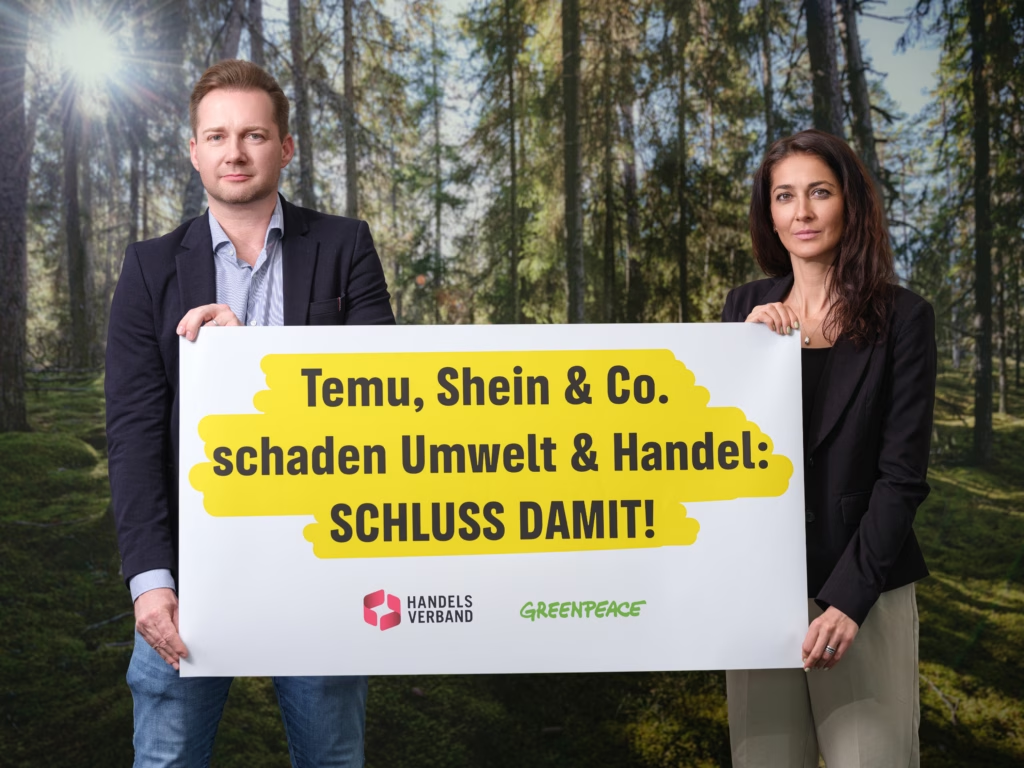Chinesische Onlineplattformen bedrohen Österreichs Handel mit Steuertricks und fluten uns mit giftigen Chemikalien – 4-Punkte-Plan für fairen und umweltverträglichen Handel.

Onlineplattformen wie Temu, Shein und AliExpress überrollen mit aggressivem Marketing und Dumpingpreisen den europäischen Handel – auf Kosten von Konsument:innen, Umwelt und fair wirtschaftenden Händlern. Greenpeace und der Handelsverband schlagen Alarm und präsentieren vier zentrale Forderungen für Fairness im digitalen Handel und zum Schutz der Umwelt.
Rainer Will, Geschäftsführer des Handelsverbands: „ Fernost-Plattformen wie Temu, Shein und AliExpress stehen für eine Generation von Onlinehändlern, die sich am mangelnden EU-Rechtsvollzug bereichern, auf Kosten heimischer Konsument:innen, Händler und der Umwelt. Der unfaire Wettbewerb katapultierte Temu auf Rang 4 und Shein auf Rang 9 der umsatzstärksten Onlineshops in Österreich und macht hunderttausende Menschen zu Leidtragenden – durch Wohlstands- und Arbeitsplatzverluste sowie negative Umwelt- und Gesundheitsfolgen.“
Ursula Bittner, Wirtschaftsexpertin von Greenpeace: „ Shein und Temu fluten Europa mit Billigprodukten, die oft gefährliche Chemikalien enthalten. Dieses Geschäftsmodell ist nicht nur ein Sicherheitsrisiko für die Gesundheit der Verbraucherinnen und Verbraucher, sondern basiert auf unfairen Arbeitsbedingungen und gefährdet die Umwelt. Das ist ein ökologischer und sozialer Skandal.“
Marktmacht wächst rasant: Temu & Shein in Österreich bereits unter den Top 10 Webshops
Laut dem Marktforschungsinstitut NielsenIQ zählen Temu und Shein bereits zu den zehn umsatzstärksten Onlineshops in Österreich. 2024 erreichte Temu Platz 4, Shein Platz 9. Ein Ende des Wachstums ist nicht in Sicht – im Gegenteil, der Zollstreit der USA mit China wird heuer massive Handelsumlenkungen nach Europa zur Folge haben. Im Vergleich zum klassischen Handel setzen diese Plattformen auf Direktversand aus China, meist per klimaschädlicher Luftfracht, ohne Verantwortung für Produktsicherheit, Steuern oder Umweltstandards zu übernehmen.
Laut NIQ-Zahlen erwirtschaften die Fernost-Player mehr als die Hälfte ihres Umsatzes in den Segmenten Bekleidung, Haushalt und Elektronik. Im Vorjahr hat bereits ein Viertel aller Österreicher:innen zumindest 1x bei Temu bestellt, 16% bei Shein und 5% bei AliExpress. Die 150-Euro-Zollfreigrenze wird systematisch missbraucht – zum Schaden des heimischen Handels (4,5 Mrd. Euro Umsatzentgang), der Innenstädte (15 Prozent Leerstand) und der öffentlichen Hand (750 Mio. Euro MwSt.-Entgang).
Deshalb legen Greenpeace und der Handelsverband einen 4-Punkte-Plan vor:
Senkung der 150-Euro-Zollfreigrenze auf 0 Euro
2024 wurden 4,6 Mrd. Pakete mit Waren unter 150 Euro aus Fernost nach Europa geliefert, laut EU-Kommission zwei Drittel davon falsch deklariert. 91 Prozent stammen aus China. Betrüger:innen umgehen systematisch Zölle und Steuern, etwa durch Teillieferungen. Der Schaden für den österreichischen Handel liegt bei 4,5 Mrd. Euro. Innenstädte leiden unter Leerstand, den Kommunen entgehen Millionen an Steuereinnahmen.
Mehr Ressourcen für Zollbehörden und strenge Importkontrollen
Produkte von Temu, Shein und AliExpress enthalten oft verbotene Chemikalien, darunter auch die gefährliche Ewigkeitschemikalien (PFAS) – zum Teil weit über den gesetzlichen Grenzwerten. Bei Spielwaren liegt die Beanstandungsquote bei bis zu 100 % der Testkäufe. Dennoch gelangen solche Produkte wegen unzureichender Kontrollen ungehindert auf den Markt. Die enorme Menge an Billigwaren aus Asien überfordert die bestehenden Kontrollkapazitäten der nationalstaatlichen Zollbehörden – diese müssen gestärkt werden.
Einführung einer Paketabgabe auf B2C-Sendungen von Drittstaaten-Plattformen
Mit jährlich rund 4,6 Milliarden Paketen aus Fernost wächst nicht nur die Müllflut, sondern auch der CO₂-Ausstoß durch klimaschädliche Transportwege, meist per Luftfracht. Greenpeace und der Handelsverband fordern die Einführung einer Paketabgabe (Handling Fee) auf B2C-Sendungen aus Drittstaaten. Diese Maßnahme soll helfen, Steuerbetrug zu bekämpfen, Umweltkosten zu berücksichtigen und für mehr Fairness im Handel zu sorgen.
Temporäre Sperre bei wiederholtem Rechtsbruch
Fernost-Plattformen umgehen vielfach EU-Vorgaben – meist ohne Konsequenzen. Wiederholte Rechtsverstöße müssen zu temporären Plattform-Sperren führen. Die günstigen Online-Produkte von Temu, Shein & AliExpress weisen teils massive Sicherheitsmängel auf. Tests zeigen: Ein Shein-Schuh enthielt 229-mal mehr schädliche Weichmacher als erlaubt. Laut AGES sind 80 Prozent der Spielwaren auf Temu mangelhaft – bei Schaukeln sogar alle. Kein einziges Spielzeug der getätigten Testkäufe auf Temu erfüllte laut Herstellerverband die EU-Vorgaben.
Rainer Will vom Handelsverband: „ Der scheinbar günstige Warenbezug über Fernost-Plattformen wie Temu, Shein und AliExpress kommt uns letztlich teuer zu stehen. Millionen falsch deklarierter Pakete entziehen Städten und Gemeinden wichtige Kommunalsteuereinnahmen – weniger lokale Jobs bedeuten weniger Steueraufkommen. Die Müllflut gefährdet nicht nur unseren Planeten, sondern auch unsere Innenstädte. Die von der Bundesregierung angekündigten strengeren Kontrollen sind ein wichtiger Schritt. Weitere Maßnahmen sind nötig – ein drittes großes Verteilerzentrum für Dumpingpakete in Europa steht kurz vor der Inbetriebnahme, die Zeit läuft uns davon.“
Ursula Bittner von Greenpeace ergänzt: “ Temu und Shein stehen für eine Handelslogik, die Ressourcen verschwendet, Luft verpestet und unsere Märkte mit umweltschädlicher Billigware überschwemmt. Diese Art des Handels können und dürfen wir uns nicht mehr leisten. Klima- und Umweltschutz müssen ernst genommen werden – auch im digitalen Handel.“
